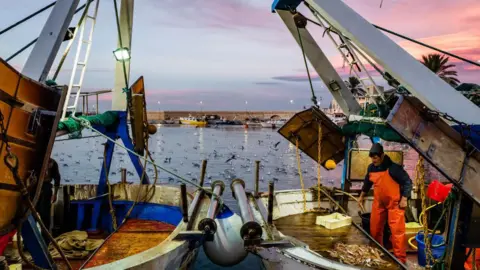### UK Government Proposes To Expand Ban on Bottom Trawling in Effort to Protect Marine Life
In a significant environmental initiative, the United Kingdom government has announced plans to enlarge the existing ban on bottom trawling, a fishing practice recognized for its destructive impact on seabed ecosystems. This move seeks to extend the prohibition from 18,000 km² to approximately 30,000 km², covering around 11,500 square miles of designated protected offshore areas.
The proposition, aimed at safeguarding delicate marine habitats, comes as part of a broader governmental focus on environmental protection, coinciding with the UN Ocean Conference slated to begin in France. The urgency of this proposal is underscored by alarming warnings from renowned naturalist Sir David Attenborough, who has cautioned that bottom trawling is wreaking havoc on marine environments, irreparably damaging ecosystems and the myriad species that inhabit them.
Environment Secretary Steve Reed articulated the government’s stance, emphasizing that “without urgent action our oceans will be irreversibly destroyed.” This declaration indicates a firm recognition the government is adopting towards threats facing marine ecosystems due to industrial fishing practices, particularly bottom trawling, which involves dragging massive nets across the seafloor, indiscriminately capturing a variety of marine species while simultaneously destroying their habitats.
### Context of the Proposal and Consultation Process
Sir David Attenborough, during a prior engagement with Prince William, expressed his profound dismay towards the practice of bottom trawling, which is graphically depicted in his latest documentary, “Ocean With David Attenborough.” The documentary showcases disturbing footage of a bottom trawling net sweeping across the seafloor, unearthing delicate life forms and disturbing sediment without discrimination.
The urgency of the ban was further amplified last week when Members of Parliament on the Environmental Audit Committee reiterated calls to prohibit not only bottom trawling but also dredging and seabed mining in Marine Protected Areas (MPAs). The expansion plan under consideration would benefit 41 of the 178 MPAs across the UK, targeting vital habitats for rare marine species that depend heavily on the integrity of the seabed.
As part of the proposal, the government intends to engage in a detailed 12-week consultation process aiming to gather insights and opinions from various stakeholders in the marine and fishing industries. This consultation, which will conclude on September 1, is crucial in tailoring policies that balance environmental protection with the economic realities of fishing communities.
Ariana Densham from Greenpeace UK has remarked that the consultation appears to be a much-needed conclusion to discussions initiated by the previous government. The Wildlife Trust welcomes the proposition, expressing hope for a swift implementation of the extended ban, which it believes would represent a “win-win for both nature and the climate.”
### International Implications and The Ocean Conference
In addition to the domestic implications of the proposed ban, there is growing pressure at the international level for more countries to ratify the High Seas Treaty during the Ocean Conference in Nice. This treaty was established by 193 nations two years ago with the aim of designating 30% of the world’s oceans as protected areas to enhance marine conservation efforts. However, the treaty will only come into effect once ratified by 60 nations. Currently, only 28 countries have completed this process, with the UK being among those that have yet to take this critical step.
The proposed expansion of the ban on bottom trawling highlights the increasing recognition of the necessity to protect fragile marine ecosystems not just regionally but on a global scale. The ongoing dialogues at the Ocean Conference and the government’s actions reflect a collective acknowledgment of the urgency of sustaining oceanic health for both present and future generations. By implementing this ban, the UK aligns itself with increasing global demands for better conservation practices and a more sustainable approach to fishing that respects and nurtures ocean biodiversity.



